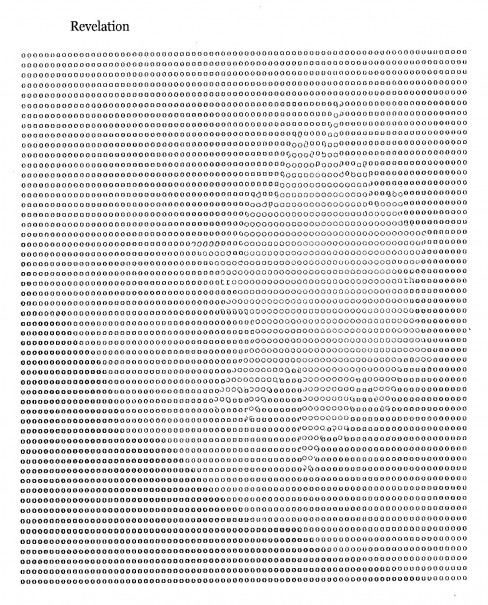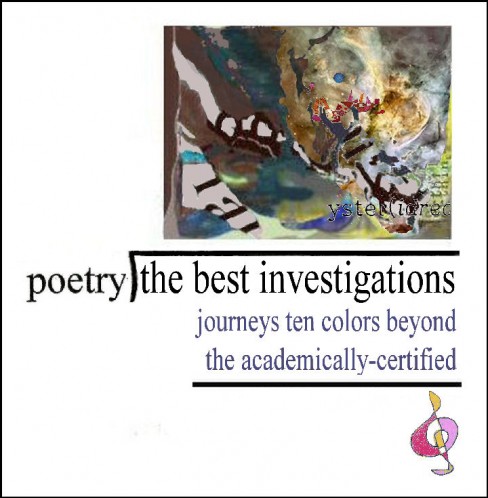Archive for the ‘Kinds of Poetry’ Category
Entry 670 — My Latest Mathemaku
Wednesday, February 29th, 2012
Just in case somebody found the secret word in “Revelation” but didn’t recognize it as a word, I should tell you that it is misspelled.
And here’s “The Best Investigations, No. 2,” my latest mathemaku:
I’m not sure whether I like it. I just thought it appropriate to give science its due. The quotient is what I’m unsure of. I’m pretty sure I can fix it, if it needs fixing.
.
Entry 668 — A Visit to Haiku Canada Review
Monday, February 27th, 2012
Here’s a visual haiku I like from the latest issue of Haiku Canada Review (Volume 6, Number1):
Another haiku I liked was in a letter to Haiku Canada Review from Dina E. Cox:
new snow
I almost forget
our quarrel
One last haiku I want to mention so I can make a negative remark is this, by Marshall Hryciuk:
smudge of cloud
boat’s murmur
lost in the waves
My negative remark is not about Marshall’s poem, which I like a lot, but about the renku, an example of which Marshall’s poem begins. I can’t remember ever reading one that didn’t fairly quickly pall on me, although I’ve certain read ones which, like this one, were full of good and sometimes excellent material. I think it too difficult for a renku to stick closely enough to a particular topic (and it needn’t be a narrow one) for me to feel I have to hit my appreciation’s restart button too often. I believe, no doubt arrogantly, that the many people who like poems that jump around, lack the ability intensely to appreciate sufficiently to have trouble easing from one nice image to an unrelated nice image. Renku “stanzas” Of course, many of the best poems seem at first to lack what some would call inexorability and should be grazed at first rather than gobbled. A renku’s “stanzas,” if any good, are too strong too allow an engagent like me to do that for more than five or six of them.
There were a lot of other good haiku in the issue. Anyone interested in the form really should become a member of Haiku Canada. (Note: you don’t have to be Canadian.)
.
Entry 667 — Re: “Revelation”
Sunday, February 26th, 2012
There’s little to say about the above except that I consider it a joke that can be taken to thoughts quite deep once you’ve carefully examined it.
A hint to solve it, written in reverse so you won’t accidentally see it and miss the fun of solving it without help: drow a rof kool.
.
Entry 666 — Some Boilerplate from Me on the Value of Criticism.
Saturday, February 25th, 2012
Here’s a quotation from Randall Jarrell that I completely disagree with: “Remember . . . that criticism is no more than (and no less than) the helpful remarks and the thoughtful and disinterested judgment of a reader, a loving and experienced and able reader, but only a reader. . . “ I say a great critic of a poem about daffodils, say, equals the creator of the poem–why should something brilliant about a poem about daffodils not be as valuable as something brilliant about daffodils? I find Eliot the critic as worth reading as Eliot the Poet; Ditto Coleridge. Hayden is as worth reading as most poets though not himself a poet. I’m afraid I don’t think much of Jarrell as either a poet or critic. I. A. Richards was a top-drawer critic, but not quite that as a poet–I vaguely remember that he wrote poetry, but I’m not sure of it. William Empson’s criticism impresses me much more than his poetry. Cleanth Brooks is an under-rated critic but not a poet. Northrop Frye is another first-line critic who wrote no poetry that I know of. Their names will last longer than a lot of poets once widley honored.
Bonus (which I will comment on tomorrow–and, yes, it is–among other things–a puzzle-poem):
.
Entry 664 — “Mathemaku in Praise of Reading, No. 1″
Thursday, February 23rd, 2012
In less than a week, I’ve be putting up another show. This one will be in the school board building, so teachers will be passing by it. Ergo, I’m trying to use pieces they may like, including the following:
I may have posted this before, and/or posted the much more elaborate, full color version of it I made . . . but now think too elaborate.
.
Entry 660 — Tiny Revision
Sunday, February 19th, 2012
I’m beginning to think this one is okay, after all. One thing I’ve been meaning to point out in case any future students of poetry are ever drawn to my work is that I seem more and more lately to be recycling old images of mine–like the remainder in this piece, and the boats from Klee. I consider this a step up, not down, because it’s a way of multiplying allusions. It’s also a form of variations on themes.
Entry 659 — A Tribute to the Piano
Saturday, February 18th, 2012
I had high hopes for this one, which I composed yesterday. I even thought I might work a sequence out of it, using the Klee ship “musical theme” as the first step of a visual symphony. But I wasn’t satisfied with what I did with the ships. As I worked with them, though, I came up with a lot of minor ideas I liked. The main one was a suddenly conscious attempt to provide a metaphor for the coming of spring. But I also liked breaking up what was originally as single framed image, and changing the sizes of each unit. Grey-scaling the first two tiny ones seemed a nice touch, too. And the escape of the final ship! I didn’t like my dividend too well, either–after my initial enthusiasm for it (being a sucker for anything having to do with spring). For some reason it doesn’t seem quite there, for me. Maybe I’ll simplify it to, “a brook’s revived consideration of an April countryside.” Yes, I think I was trying for too much. . . .
.
Entry 657 — My Motto as a Poetry Critic
Thursday, February 16th, 2012
Thinking about what Tony Robinson had at his blog spurred me to this motto of my own (obnoxious) practice as a poetry critic: Try for maximal understanding of the nature and value of what I’m critiquing, fully committed to the advance of poetry, as I understand it, and expressed with the best balance of clarity and fresh language I can manage. I originally continued with “–with no significant suppression of emotion, regardless of the tender feelings of the hyper-offendable,” but upon reflection found that nice to say but too secondary for this motto.
Better: Using the the best balance of clarity and fresh language I can manage, try to express maximal understanding of the nature and value of what I’m critiquing, fully committed to the advance of poetry, as I see it. Ah, but I now see that “the value of what I’m critiquing” would include what the latter does to advance poetry. Ergo: Try, using the the best balance of clarity and fresh language I can manage, to express maximal understanding of the nature and value of what I’m critiquing.
And here’s a copy (an imperfect one) of my motto as a poet:
.
Entry 653 — A Response to Hal Johnson’s Poem
Sunday, February 12th, 2012
Here’s Hal Johnson’s visio-infraverbal poem again:
”Lost in thought” is the simplest explication of this, but a better reading focuses on thought that is opposed, disrupted, damaged and finally sent in the wrong direction back to its futile beginning. With “ugh” and “tough” being disconcealed in the process further to suggest the losing struggle for meaning expressed. In short, a deft pwoermd. A visuaol one as well as infraverbal because you can see the word’s letters metaphorically enacting the struggle.
.
Entry 652 — An Infraverbal Poem by Hal Johnson
Saturday, February 11th, 2012
Here’s an infraverbal poem–actually a visio-infraverbal poem–Hal Johnson posted at New-Poetry:
.






